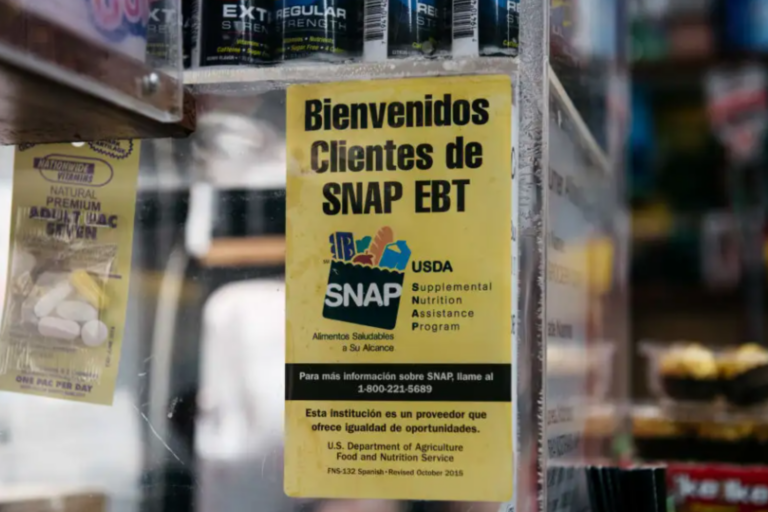By Meena Duerson
Vice
Stimulus checks have started to land in Americans’ bank accounts this week, but millions of U.S. citizens won’t get the money they were expecting.
The government’s aid package to help those struggling during the pandemic contains a small line that excludes a huge group of people: anyone whose tax return was filed without a Social Security number.
That blocks not only undocumented immigrants from receiving the benefits but also the spouses and children they share a tax return with, even if those people are born-and-raised U.S. citizens. As of 2017, an estimated 8 million U.S. citizens live with an undocumented individual, including nearly 6 million children.
“That could pay our house payment, our bills for a few months, you know, maybe until this thing is over,” said Ginger M., who asked not to use her last name for fear of jeopardizing her husband’s pending immigration case. “It just feels like our country’s failed us as citizens, because we’re not getting any of that help that’s supposed to be for us.”
Being barred from federal help isn’t a new feeling for these families. Many of them said they were afraid they wouldn’t get the money because they’re already denied benefits. For example, families that file with an Individual Taxpayer Identification Number (ITIN) — a designation the IRS issues to workers ineligible for Social Security numbers — can’t access the earned income credit.
Although that policy has been in effect for decades, undocumented families had hoped the government would allocate aid differently during the coronavirus pandemic, which has left 22 million out of work for the first time.
Ginger was shocked when she found out her family wouldn’t be able to receive any stimulus money. She and her three children are U.S. citizens, but her husband, who’s from El Salvador and has been pursuing legal status for years, uses an ITIN on his taxes. His painting business has collapsed since the coronavirus hit, and they don’t know if it will ever recover.
“It just feels like our country’s failed us as citizens, because we’re not getting any of that help that’s supposed to be for us.”
But an ITIN doesn’t meet the requirement of a “valid identification number” as defined by the Coronavirus Aid, Relief, and Economic Security (CARES) Act, which Congress passed last month. While some people have already received their stimulus money, Ginger’s family, classified as a “mixed status” household, can’t collect what could have been several thousand dollars.
“There’s so many men and women that have fallen in love with an undocumented immigrant and got married and had kids and built a life here,” Ginger said, “and to be punished for that, it’s just — I don’t understand it.”
“I wish I could say I was surprised, but I wasn’t,” Halina Schiffman-Shilo, an immigration attorney at the New York Legal Assistance Group, said of the bill’s language. “The level of cruelty in it really struck a chord, particularly because so many undocumented immigrants are front-line defenders.”
“These are people who’ve been paying taxes for years, who are contributing to the economy or contributing to our hospitals and our schools and our roads into our federal coffers, and who are getting absolutely nothing in return,” Schiffman-Shilo added.
Like so many couples in their situation, Ginger and her husband file taxes jointly, a practice immigration attorneys often recommend because it strengthens the case for legal residency. So does Christina Segundo-Hernandez, an American citizen living in Texas whose husband is from Mexico.
“They told us if we filed a joint return with me and the kids, it’s more proof that you have children and a wife,” she said.
Her family’s financial situation is becoming more precarious by the day. Her husband’s hours working construction have been slashed, and she had to give up her part-time job at UPS.
“We’re kind of touch and go, day by day,” she said. “I’m seriously worried about what I’m going to do.”
That makes the news that she also won’t receive any of the government’s much-touted aid distressing: “I think it’s unfair; it’s un-American.”
Other families said they never expected their undocumented relatives to receive any benefits, but they’re most upset that their children, who are American citizens, are being denied the money.
“I think it was a pretty poor decision by our government, for the kids,” said Melina Rodriguez, a Kentucky native who won’t get the benefit for herself or her 12-year-old daughter because her husband is undocumented. “That’s like taking food out of their mouths. It’s really frustrating, because it’s not the children’s fault.”
Tax experts told VICE News they’re being deluged with questions from families about how they might get around the rules. Some Congressional lawmakers are pushing for an amendment that would directly benefit all taxpayers, regardless of status, and states like California may take it into their own hands to create benefits for undocumented residents. But the reality is that the federal policy likely won’t change.
“In this political climate it’s a nonstarter,” said Jacqueline Lainez Flanagan, a visiting professor of law at American University and an expert on immigration and tax issues. “Between the House and the Senate to agree on passage, it requires not political grandstanding on immigration issues, which is what this would be.”
The one exception for mixed-status families is if one spouse was a member of the armed forces at the time of their filed tax return. Otherwise, they’re stuck — and angry that their fellow Americans don’t seem to know they’re being left out.
“Every single person that I’ve told about it is in shock,” Ginger said. “They can’t believe it. They say, ‘Why don’t they give it to you? Or at least just the kids?’”
Originally published in Vice on April 16, 2020.








